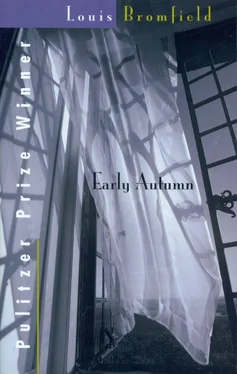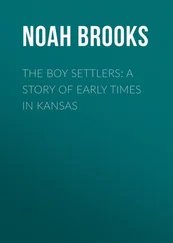She went quickly away because she knew it was perilous to sit there any longer talking of such things while Sybil watched her, eager with the freshness of youth which has all life before it.
Out of all their talk two things remained distinct in her mind: one that Sybil thought of O’Hara as middle-aged—almost an old man, for whom there was no longer any chance of romance; the other the immense possibility for tragedy that lay before a girl who was so certain that love would be a glorious romantic affair, so certain of the ideal man whom she would find one day. What was she to do with Sybil? Where was she to find that man? And when she found him, what difficulties would she have to face with John Pentland and Anson and Aunt Cassie and the host of cousins and connections who would be marshaled to defeat her?
For she saw clearly enough that this youth for whom Sybil was waiting would never be their idea of a proper match. It would be a man with qualities which O’Hara possessed, and even Higgins, the groom. She saw perfectly why Sybil had a fondness for these two outsiders; she had come to see it more and more clearly of late. It was because they possessed a curious, indefinable solidity that the others at Pentlands all lacked, and a certain fire and vitality. Neither blood, nor circumstance, nor tradition, nor wealth, had made life for them an atrophied, empty affair, in which there was no need for effort, for struggle, for combat. They had not been lost in a haze of transcendental maunderings. O’Hara, with his career and his energy, and Higgins, with his rabbit-like love affairs and his nearness to all that was earthy, still carried about them a sense of the great zest in life. They reached down somehow into the roots of things where there was still savor and fertility.
And as she walked along the hallway, she found herself laughing aloud over the titles of the only three books which the Pentland family had ever produced—“The Pentland Family and the Massachusetts Bay Colony” and Mr. Struthers’ two books, “Cornices of Old Boston Houses” and “Walks and Talks in New England Churchyards.” She thought suddenly of what Sabine had once said acidly of New England—that it was a place where thoughts were likely to grow “higher and fewer.”
But she was frightened, too, because in the life of enchantment which surrounded her, the virtues of O’Hara and Higgins seemed to her the only things in the world worth possessing. She wanted desperately to be alive, as she had never been, and she knew that this, too, was what Sybil sought in all her groping, half-blind romantic youth. It was something which the girl sensed and had never clearly understood, something which she knew existed and was awaiting her.
3
Sabine, watching O’Hara as he crossed the fields through the twilight, had penetrated in a sudden flash of intuition the depths of his character. His profound loneliness was, perhaps, the key which unlocked the whole of his soul, a key which Sabine knew well enough, for there had never been a time in all her existence, save for a sudden passionate moment or two in the course of her life with Callendar, when she was free of a painful feeling that she was alone. Even with her own daughter, the odd Thérèse, she was lonely. Watching life with the same passionate intensity with which she had watched the distant figure of O’Hara moving away against the horizon, she had come long ago to understand that loneliness was the curse of those who were free, even of all those who rose a little above the level of ordinary humanity. Looking about her she saw that old John Pentland was lonely, and Olivia, and even her own daughter Thérèse, rambling off independently across the marshes in search of bugs and queer plants. She saw that Anson Pentland was never lonely, for he had his friends who were so like him as to be very nearly indistinguishable, and he had all the traditions and fetishes which he shared with Aunt Cassie. They were part of a fabric, a small corner in the whole tapestry of life, from which they were inseparable.
Of them all, it seemed to her, as she came to see more and more of O’Hara, that he was the most lonely. He had friends, scores, even hundreds of them, in a dozen circles, ranging from the docks where he had spent his boyhood to the world about Durham where there were others who treated him less coldly than the Pentland family had done. He had friends because there was a quality about him which was irresistible. It lurked somewhere in the depths of the humorous blue eyes and at the corners of the full, rather sensual mouth—a kind of universal sympathy which made him understand the fears, the hopes, the ambitions, the weaknesses of other people. It was that quality, so invaluable in politics, which led enemies unjustly to call him all things to all people. He must have had the gift of friendship, for there were whole sections of Boston which would have followed him anywhere; and yet behind these easy, warm ties there was always a sort of veil shutting him away from them. He had a way of being at home in a barroom or at a hunt breakfast with equal ease, but there was a part of him—the part which was really O’Hara—which the world never saw at all, a strangely warm, romantic, impractical, passionate, headlong, rather unscrupulous Irishman, who lay shut away where none could penetrate. Sabine knew this O’Hara; he had been revealed to her swiftly in a sudden flash at the mention of Olivia Pentland. And afterward when she thought of it, she (Sabine Callendar), who was so hard, so bitter, so unbelieving, surrendered to him as so many had done before her.
Standing there in her sitting room, so big and powerful and self-reliant, he had seemed suddenly like a little boy, like the little boy whom she had found once late at night long ago, sitting alone and quite still on the curb in front of her house in the Rue de Tilsitt. She had stopped for a moment and watched him, and presently she had approached and asked, “What are you doing here on the curb at this hour of the night?” And the little boy, looking up, had said gravely, “I’m playing.”
It had happened years ago—the little boy must have grown into a young man by now—but she remembered him suddenly during the moment when O’Hara had turned and said to her, “It will mean a great deal to me, more than you can imagine.”
O’Hara was like that, she knew—sad and a little lonely, as if in the midst of all his success, with his career and his big new house and his dogs and horses and all the other shiny accoutrements of a gentleman, he had looked up at her and said gravely, “I’m playing.”
Long ago Sabine had come to understand that one got a savor out of life by casting overboard all the little rules which clutter up existence, all the ties, and beliefs and traditions in which she had been given a training so intense and severe that in the end she had turned a rebel. Behind all the indifference of countenance and the intricacy of brain, there lay a foundation of immense candor which had driven her to seek her companions, with the directness of an arrow, only among the persons whom she had come to designate as “complete.” It was a label which she did not trouble to define to anyone, doubting perhaps that anyone save herself would find any interest in it; even for herself, it was a label lacking in definiteness. Vaguely she meant by “complete” the persons who stood on their own, who had an existence sufficiently strong to survive the assault or the collapse of any environment, persons who might exist independent of any concrete world, who possessed a proud sense of individuality, who might take root and work out a successful destiny wherever fate chanced to drop them. They were rare, she had come to discover, and yet they existed everywhere, such persons as John Pentland and O’Hara, Olivia and Higgins.
Читать дальше












